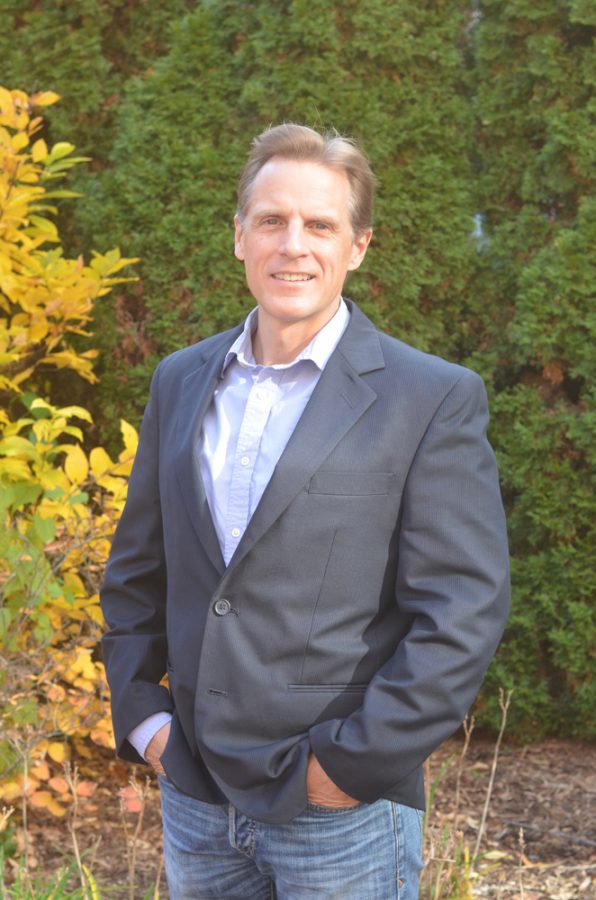Professor works with students to revitalize endangered language of Native American tribe
November 11, 2016
Assistant Professor of Education Richard Henne-Ochoa, along with Caroline Bixby ’18 and Gabi Hitel ’18, have been working to revitalize the Lakota language, a Siounan language spoken by people of the Sioux tribes. Through extensive research, as well as a trip to the Pine Ridge Reservation located in southwest South Dakota this past summer, the group has sought out immersion opportunities and looks to expand educational funding.
Henne-Ochoa became invested in the Lakota people and their language after living on the Pine Ridge Reservation for two years in the late 1990s. During this time, he learned that the language was endangered, largely from past U.S. federal policies that attempted to assimilate Native American communities into the dominant culture.
“Much of my involvement has been as a researcher seeking to understand how the Lakota language has become endangered and what measures local reservation residents are taking to revitalize it,” Henne-Ochoa said.
While all the schools located on the reservation teach Lakota language, history, and culture, a large portion of time is necessarily spent on subjects such as math, science, social studies, and language arts that are taught in English rather than the Lakota language.
In recent years, some immersion schools and day cares have begun teaching all subjects in the Lakota language.
“[Immersion schools] hold a lot of promise for revitalizing Lakota,” Henne-Ochoa said.
This past summer, Henne-Ochoa along with Bixby and Hitel spent a week on the reservation visiting schools, creating teaching tools, and learning from the Lakota people. They saw the positive results of an immersion day care first-hand.
The problem, however, is that these schools are difficult to fund and struggle to incorporate their language into everyday interactions beyond school hours.
Because immersion produces the best results for learning the language, Henne-Ochoa is working closely with the Native Americans of Pine Ridge Reservation to secure grants that will develop plans for more immersion opportunities.
The trip was a valuable experience to both Bixby and Hitel, who were able to better understand the importance of their research.
“Gabi and Caroline were able to spend time with Lakota people in their own territory, giving both of them greater insight into the research we do on Lakota language issues here at Bucknell in our Language and Education Lab,” Henne-Ochoa said.
“Many of the residents on the reservation are underprivileged, and I am extremely fortunate to be involved in trying to help them revitalize their language and culture,” Bixby said.
Both Henne-Ochoa and his students agree that unique experiences like this one are part of what makes an education at the University special.
“It is amazing to see the impacts that Bucknell students are able to have, and I am thankful that I can be a small part of that,” Bixby said.
“Nothing I have experienced has had a more profound influence on my education and teaching as has living on the reservation,” Henne-Ochoa said.
Back on campus, Henne-Ochoa and his students are continuing their research. Henne-Ochoa stressed the importance of furthering their efforts beyond the education system.
“If children, youth, parents, and elders are once again going to speak Lakota informally in most social interaction to one another—and that is the goal many Lakota people have—revitalization efforts must expand beyond the schools,” Henne-Ochoa said.






















rose • Nov 13, 2016 at 4:28 pm
I think there should be movement by all aboriginal peoples around the world to demand that their languages should official government and private sector working languages on the local and provincial levels spoken by all unless specifically stated otherwise by the tribe while leaving the national and international levels to dominate languages for obvious business reasons. Please tell all those who are aboriginal to please take advantage of current events concerning immigration, race, and ethnicity ranging from work accidents in Qatar involving guest workers, which complain about how those guest workers are treated and how the Middle Eastern countries do immigration in general, to migration crisis in Europe, which many call an invasion of Europe, and to many non Hispanic Americans complaining about the Hispanics not learning English to advance to new public heights and revitalize the aboriginal languages everywhere in the world.
rose • Nov 13, 2016 at 4:15 pm
I think Native American tribes should be more ambitious and demand for example their languages (at least those who always have had elites, nobility, royal families/hereditary chiefs, and social stratification) to be the working/official languages of the U.S. Federal Reserve on the district and branch levels and leave national and international levels to English for obvious business reasons. I think this is a great time to do so since we non-Native Americans are pouting about the Muslims and the Hispanics with the current wave of immigration and complain often times about how the Middle Eastern countries do immigration.